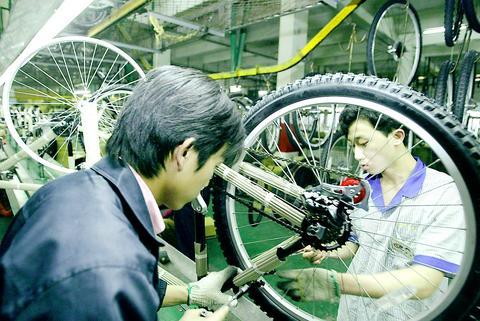In the face of overwhelming competition from Chinese original-equipment manufacturers (OEMs), Taiwanese companies should speed up developing globally recognized brand names to survive, King Liu (
"We started our own brand 18 years ago, when most Taiwanese OEMs were still doing devoted manufacturing," Liu said in a key- note speech to a seminar sponsored by Chinese-language business monthly Common Wealth magazine yesterday.
"But we still feel lonely on this road," he said.

PHOTO: EPA
The nation's top bicycle manufacturer was a key OEM provider for several well-known brands until 1986, when it decided to create its own brand after one of its main foreign clients suddenly shifted orders to another manufacturer.
That crisis forced Giant to remake itself at a time when "made in Taiwan" was a symbol of low-quality products -- but it also proved to be a turning point for the Taichung-based manufacturer, Liu said.
According to international brand consultancy firm Interbrand, Giant has a brand value of US$210 million and ranked as the sixth most valuable brand in the country last year, after Trend Micro, ASUS, Acer, Master Kong and MAXXIS.
Well-known brands make products more marketable, so even when Giant put a US$10,000 price tag on its most luxurious bike, they sold out in a short time, Liu said, adding that the largest benefit of a well-known brand is developing loyal customers who stick to the products.
"When I was in our outlet in Shanghai, a customer told me that Giant bicycles are the most commonly stolen bikes," Liu said, laughing. "Her son has lost seven Giant bikes, yet he still wants a Giant."
Giant has established two manufacturing plants in China since 1993, one in Kunshan, Jiangsu Province, and the other in Pudong near Shanghai.
Even though many local OEMs are aware of the importance of branding after seeing orders being snatched away by cheaper Chinese counterparts, few have taken any practical action and most have just moved their factories to China to save money, Liu said.
"But creating a brand name is the direction to take," he said.
Liu suggested that companies intending to develop their own brands change their company strategy first and work to improve their products on a day-by-day basis to motivate them to innovate.
Eventually, they will come up with unique products, Liu said. Of course, successful products should be combined with good marketing strategies, distribution channels and after-sales service in order to develop a dependable brand, he said.
Liu stressed the importance of the massive Chinese market, saying it is the world's supply hub with companies from all over the world as well as Chinese firms battling to grab a slice of the pie.
Giant sees China as its most important market and it is establishing its third manufacturing plant there in Chengdu, Sichuan Province, in an effort to meet increasing market demand.
"Having our own distinguished brand name is the sharpest weapon [for Taiwanese companies], especially since `made in Taiwan' is now a symbol of higher value-added products," Liu said.

PATENTS: MediaTek Inc said it would not comment on ongoing legal cases, but does not expect the legal action by Huawei to affect its business operations Smartphone integrated chips designer MediaTek Inc (聯發科) on Friday said that a lawsuit filed by Chinese smartphone brand Huawei Technologies Co (華為) over alleged patent infringements would have little impact on its operations. In an announcement posted on the Taiwan Stock Exchange, MediaTek said that it would not comment on an ongoing legal case. However, the company said that Huawei’s legal action would have little impact on its operations. MediaTek’s statement came after China-based PRIP Research said on Thursday that Huawei filed a lawsuit with a Chinese district court claiming that MediaTek infringed on its patents. The infringement mentioned in the lawsuit likely involved

Taipei is today suspending work, classes and its US$2.4 trillion stock market as Typhoon Gaemi approaches Taiwan with strong winds and heavy rain. The nation is not conducting securities, currency or fixed income trading, statements from its stock and currency exchanges said. Authorities had yesterday issued a warning that the storm could affect people on land and canceled some ship crossings and domestic flights. Taiwan Semiconductor Manufacturing Co (TSMC, 台積電) expects its local chipmaking fabs to maintain normal production, the company said in an e-mailed statement. The main chipmaker for Apple Inc and Nvidia Corp said it has activated routine typhoon alert

GROWTH: TSMC increased its projected revenue growth for this year to more than 25 percent, citing stronger-than-expected demand for AI devices and smartphones The Taiwan Institute of Economic Research (TIER, 台灣經濟研究院) yesterday raised its forecast for Taiwan’s GDP growth this year from 3.29 percent to 3.85 percent, as exports and private investment recovered faster than it predicted three months ago. The Taipei-based think tank also expects that Taiwan would see a 8.19 percent increase in exports this year, better than the 7.55 percent it projected in April, as US technology giants spent more money on artificial intelligence (AI) infrastructure and development. “There will be more AI servers going forward, but it remains to be seen if the momentum would extend to personal computers, smartphones and

Catastrophic computer outages caused by a software update from one company have once again exposed the dangers of global technological dependence on a handful of players, experts said on Friday. A flawed update sent out by the little-known security firm CrowdStrike Holdings Inc brought airlines, TV stations and myriad other aspects of daily life to a standstill. The outages affected companies or individuals that use CrowdStrike on the Microsoft Inc’s Windows platform. When they applied the update, the incompatible software crashed computers into a frozen state known as the “blue screen of death.” “Today CrowdStrike has become a household name, but not in